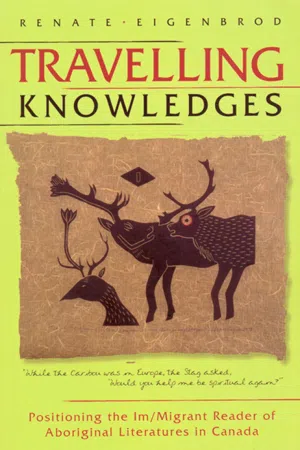ENDNOTES
PREFACE
1. Lawrence Grossberg, “Wandering Audiences, Nomadic Critics,” Cultural Studies 2, 3 (1988): 377.
2. Edward Said, Reflections on Exile and Other Essays (Cambridge, MA: Harvard University Press, 2000), 403.
3. Quoted in Hartmut Lutz, “‘Talking at the Kitchen Table: A Personal Homage to Rita Joe of Eskasoni Reserve, Cape Breton Island, Nova Scotia,” in Down East—Critical Essays on Contemporary Maritime Canadian Literature, ed. Wolfgang Hochbruck and James O. Taylor (Trier: WVT, 1996), 278.
4. In this study I will use the qualifiers “First Nations,” “Native,” “Indigenous,” and “Aboriginal” interchangeably, as they are all in use. A preference for one name falsely standardizes a varied and always changing praxis of naming, by the peoples themselves and by the government and society at large. “Aboriginal” is more often used than “First Nations,” as this name includes the Métis. The most appropriate adjective in naming the peoples and their literatures would be a nation- or culture-specific identification like Anishnabe, and whenever applicable this will be used. The word “Anishnabe” has several spellings, and I have chosen to use this spelling for consistency. Although some Native people refer to themselves as “Indians,” for different reasons, I, as a non-Native person, will not use this term because of its colonialist and racist connotations.
5. Lee Maracle, “Oratory: Coming to Theory,” in Give Back: First Nations Perspectives on Cultural Practice (Vancouver: Gallerie Publications, 1992).
6. Susan Berry Brill de Ramirez, Contemporary American Indian Literatures and the Oral Tradition (Tucson: University of Arizona Press, 1999), 6.
7. Norval Morriseau, Legends of My People, The Great Ojibway, ed. Selwyn Dewdney (Toronto: McGraw-Hill Ryerson, 1965), xv.
8. Therefore, although I am differently positioned in relation to my topic than Stan Dragland in relation to Duncan Campbell Scott, I align myself with his ambivalent attitude towards objectivity for similar reasons. In his introduction to Floating Voice he writes: “I haven’t tried for objectivity at every point, feeling that the stresses of a study like this ought not to be concealed, feeling that I can trust the reader to weather the turbulence” (The Floating Voice: Duncan Campbell Scott and the Literature of Treaty 9 [Concord, ON: Anansi, 1994], 12).
9. Rosi Braidotti, Nomadic Subjects: Embodiment and Sexual Difference in Contemporary Feminist Theory (New York: Columbia University Press, 1994), 12.
10. Reed Way Dasenbrock, “Do We Write the Text We Read?” in Falling into Theory: Conflicting Views on Reading Literature, ed. David H. Richter (Boston: Bedford Books of St. Martin’s Press, 1994), 248.
11. Hartmut Lutz, “‘Is the Canadian Canon Colorblind?’: On the Status of Authors of Color in Canadian Literature in English,” Zeitschrift fuer Anglistik und Amerikanistik 44, 1 (1996): 52. I agree with Thomas Parkhill (Weaving Ourselves into the Land [Albany: State University of New York Press, 1997]) that “‘Whiteman,’ ‘White,’ ‘White Man,’ as well as their substitutes, ‘non-Indian,’ and ‘non-Native’ are, in most usages, stereotypical foils for images of the ‘Indian’” (5). When I use these terms, I follow the reasoning of the literature I am discussing. Given the key words in the title for this study, I often use the qualifier “migrant” and “immigrant” but also Euro-Canadian or Euro-American.
12. Brill de Ramirez, Contemporary American Indian Literatures, 13.
13. Carole Boyce Davies, Black Women, Writing and Identity: Migrations of the Subject (London and New York: Routledge, 1994).
14. Willie Ermine, “Aboriginal Epistemology,” in First Nations Education in Canada: The Circle Unfolds, ed. Marie Battiste and Jean Barman (Vancouver: University of British Columbia Press, 1995), 10.
15. In her autobiography Song of Rita Joe: Autobiography of a Mi’kmaq Poet (Charlottetown: Ragweed Press, 1996), Rita Joe explains how she came to enrol herself at Shubenacadie Indian Residential School—a rarely told story.
16. The importance of routine and mechanically regulated days is emphasized in Basil Johnston’s autobiographical narrative about residential school experiences titled Indian Schooldays (Toronto: Key Porter Books, 1988). The long-lasting effects of these aspects of life at the schools are analyzed by Greg Sarris in Keeping Slug Woman Alive: A Holistic Approach to American Indian Texts (Berkeley: University of California Press, 1993).
17. Arnold Krupat (in Ethnocriticism [Berkeley: University of California Press, 1992]) uses the image of the shuttle when he distinguishes his ethnocritical movements “between Western paradigms and the as-yet-to-be-named paradigms of the Rest” (113) from James Clifford’s “perpetual shuttling back and forth between the privileged Western narrative paradigms of tragedy and comedy” (James Clifford, Routes: Travel and Translation in the Late 20th Century [Cambridge: Harvard University Press, 1997), 112). Although I agree with Krupat’s distinction, I neither subscribe to the marginalization of non-Western paradigms as “the Rest” (even if capitalized) nor to the de...
